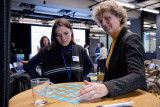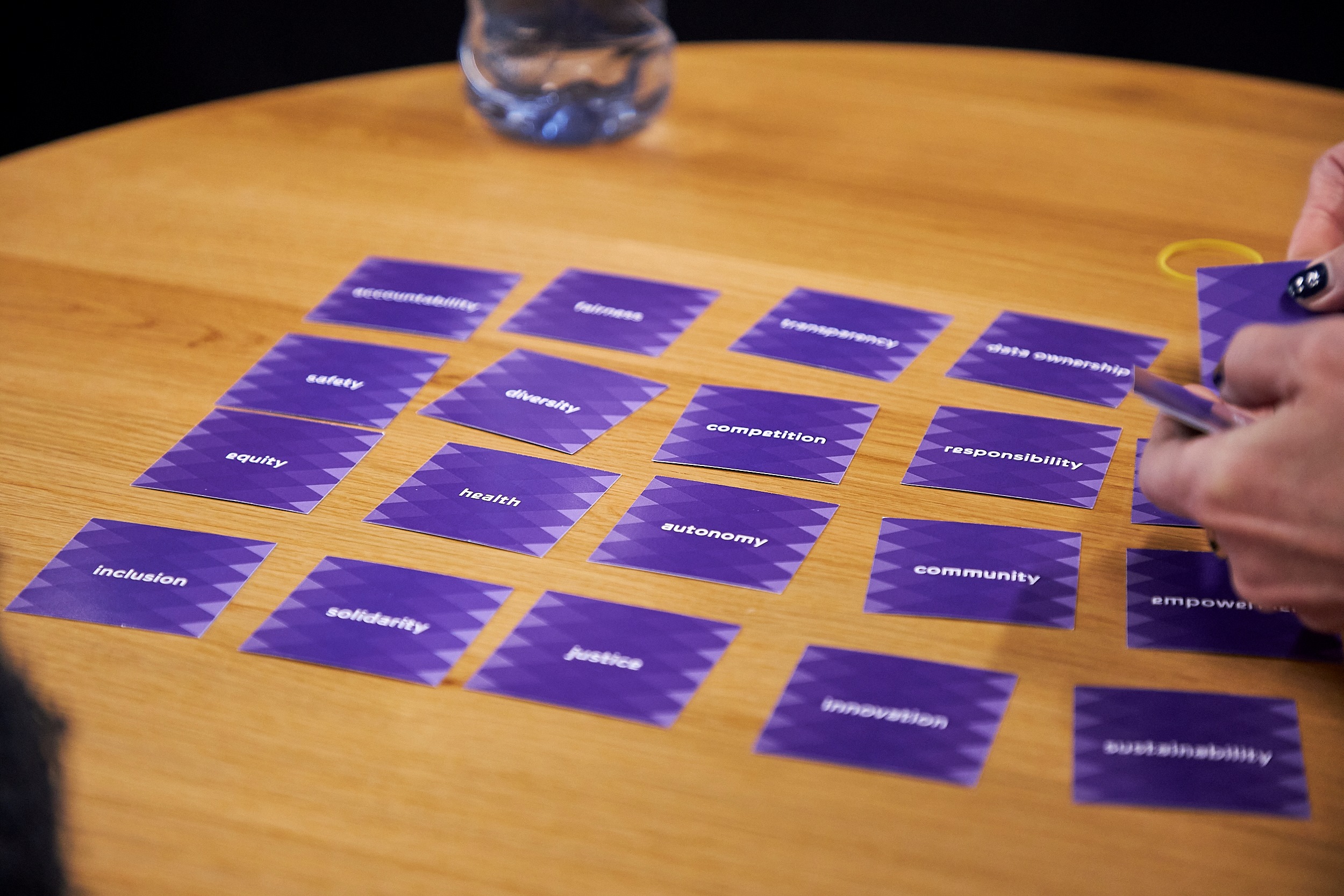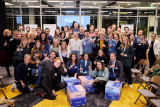Want to receive updates like this in your inbox?
Get notified about new updates, opportunities or events that match your interests.
Maybe you will also like these updates
(GESLOTEN) Vacature: Communicatie- en Programmamedewerker Amsterdam Smart City (32 uur)

Ben jij thuis in de wereld van communicatie en event management? En gaat jouw hart sneller kloppen van duurzaamheid, stedelijke innovatie en netwerken?
Kom dan als junior Communicatie- en Programmamedewerker het team van Amsterdam Smart City versterken!
Wie zijn wij?
Amsterdam Smart City is een onafhankelijk innovatieplatform, dat innovatieve bedrijven, kennisinstellingen, maatschappelijke organisaties, overheden en proactieve bewoners samenbrengt en de stad van de toekomst vormgeeft. Amsterdam Smart City maakt als programma deel uit van Amsterdam Economic Board.
Samen met 29 partners werken wij aan een betere, duurzame en toekomstbestendige wereld. Daarnaast brengen we een internationale community samen van meer dan 9.000 innovatieprofessionals, studenten en geïnteresseerden. Zij ontmoeten elkaar rond verschillende thema’s en helpen elkaar verder. Door al deze partijen te verbinden, en met hen het gesprek te voeren over de grote uitdagingen in onze regio, komen we tot nieuwe verhalen en innovatieve oplossingen die bijdragen aan betere straten, buurten en steden. We richten ons met name op vier transitiethema’s: Mobiliteit, Digitaal, Energie en Circulair.
Hier staan wij voor
Iedereen is anders, en juist met verschillende mensen werken wij nog beter aan de metropool van morgen. We zijn nieuwsgierig naar jouw talenten, wat jou bijzonder maakt. We horen graag jouw ideeën en perspectieven. Dat helpt ons om samen nog meer impact te maken.
Wat ga je doen?
Je beheert onze online kanalen en je organiseert samen met het team evenementen. Met verslaglegging, enthousiasme en het maken van nieuwe connecties binnen ons netwerk versterk je ons regionale en internationale netwerk! Je werkt nauw samen met- en ondersteunt het hele Amsterdam Smart City team en de programmadirecteur. Dit zijn je taken:
Beheer en schrijven van onze wekelijkse nieuwsbrief en LinkedIn content. Je neemt initiatieven om de interactie en het bereik te vergroten.
Je houdt toezicht op de berichten op het online platform en je stimuleert leden om content te plaatsen
Beheer info mailbox (inkomende verzoeken, vragen etc.)
Ondersteuning inhoudelijke verslaglegging netwerkevenementen en werksessies, en het opmaken van presentaties
Praktische ondersteuning bij evenementen (locaties, uitnodigingen, communicatie)
Ondersteuning bij het organiseren van werksessies en het bouwen van coalities
Wie ben jij?
Je hebt wo/hbo werk- en denkniveau, een opleiding in de richting van communicatie (of vergelijkbaar);
Je hebt 1-2 jaar werkervaring en ervaring op het gebied van online communicatie/community en/of event management
Je beheerst de Nederlandse en Engelse taal uitstekend in woord én geschrift
Je hebt affiniteit met duurzaamheid, innovatie en stedelijke ontwikkelingen en je vindt het belangrijk om met je werk maatschappelijke impact te maken.
Je beschikt over voldoende algemene kennis over bovenstaande en je kan hier helder over schrijven.
Je bent proactief en nieuwsgierig
Je bent sociaal, enthousiast en houdt van netwerken en verbinden.
Wat bieden wij?
Wij bieden je een fijne werkplek op het Marineterrein in Amsterdam, met een informele en collegiale sfeer. We zijn een klein team dat nauw met elkaar en onze partners samenwerkt.
Je wordt deel van een enorm divers en dynamisch netwerk van koplopers en pioniers in stedelijke innovatie van toonaangevende organisaties in de Metropool Amsterdam. Er is veel ruimte om te leren van collega’s en specialisten uit het netwerk en je te verdiepen in de thema’s die jou interesseren. Samen leren we door te doen!
Daarnaast bieden wij:
Een functie voor 32 uur per week;
Een half-jaar-contract met uitzicht op verlenging;
Salarisindicatie €3.300 - €3.500 bruto per maand (o.b.v. 40 uur), aangevuld met vakantie- en eindejaarstoeslag.
Interesse gewekt?
Ben je enthousiast? Dan horen we graag van je! Stuur je CV en een korte motivatie uiterlijk 4 april per mail aan solliciteren@amecboard.com. De eerste gesprekken vinden plaats op 10 en 12 april. Vervolggesprekken zijn in de ochtend van 19 april. Een schrijfopdracht maakt deel uit van de procedure. Neem voor meer informatie over de functie contact op met Pelle Menke. Hopelijk spreken we elkaar snel!
Demoday #22: Data Commons Collective

In the big tech-dominated era, data has been commercially exploited for so long that it is now hard to imagine that data sharing might also benefit the community. Yet that is what a collective of businesses, governments, social institutions and residents in Amsterdam aim to do. Sharing more data to better care for the city. On behalf of the Data Commons Collective, Lia Hsu (Strategic Advisor at Amsterdam Economic Board) asked the Amsterdam Smart City network for input and feedback on their Data Commons initiative on the last Demoday of 2023.
What is a (data) common?
Commons are natural resources that are accessible to everyone within a community. Water. Fertile soil. Clean air. Actually everything the earth has given us. We as humanity have increasingly begun to exploit these commons in our pursuit of power and profit maximisation. As a result, we risk exhausting them.
Data is a new, digital resource: a valuable commodity that can be used to improve products and services. Data can thus also be used for the common good. However there are two important differences between a common and a data common: data in commons never runs out, and data in commons is not tied to any geographical location or sociocultural groups.
Four principles for Data Commons
The Data Commons collective is currently working on different applied use cases to understand how data commons can help with concrete solutions to pressing societal problems in the areas of energy, green urban development, mobility, health and culture. Each data commons serves a different purpose and requires a different implementation, but there are four principles that are always the same:
- The data common is used to serve a public or community purpose
- The data common requires cooperation between different parties, such as individuals, companies or public institutions
- The data common is managed according to principles that are acceptable to users and that define who may access the data commons under what conditions, in what ways they may be used, for what purpose, what is meant by data misuse
- The data common is embedded to manage data quality, but also to monitor compliance with the principles and ensure that data misuse is also noticed and that an appropriate response (such as a reprimand, penalty or fine) follows.
The Data Commons Collective is now in the process of developing a framework, which provides a self-assessment tool to guide the formation of Data Commons initiatives by triggering consideration of relevant aspects for creating a data commons. It is a means of reflection, rather than prescription, to encourage sustainable and responsible data initiatives.
Energy Data Commons case and Value Workshop by Waag
After the introduction to the Data Commons Collective and Framework by Simone van der Burg (Waag) and Roos de Jong (Deloitte), the participants engaged in a value workshop led by Simone. The case we worked with: we’re dealing with a shortage of affordable and clean energy. Congestion issues are only expected to get worse, due to increased energy use by households en businesses. An energy Data Commons in neighbourhoods can have certain benefits. Such as preventing congestion issues, using clean energy sources more effectively, becoming self-sufficient as a neighbourhood and reducing costs. But under what circumstances would we want to share our energy data with our neighbours? What are the values that we find important when it comes to sharing our energy data?

Results: Which values are important when sharing our energy data?
In smaller groups, the participants discussed which values they found important for an energy data common using a value card deck from Waag. Some values that were mentioned were:
- Trustworthiness: It is important to trust one another when sharing our energy data. It helps when we assume that everyone that is part of the common has the right intentions.
- Fun: The energy Data Commons should be fun and positive! The participants discussed gamification and rewards as part of the common.
- Knowledge: One of the goals of sharing data with each other is to gain more knowledge about energy consumption and saving.
- Justice and solidarity: If everyone in the common feels safe and acknowledged, it will benefit the outcome. Everyone in the common should be treated equally.
- Inclusion and Community-feeling: It is important that people feel involved in the project. The Data Commons should improve our lives, make it more sustainable but also progress our social relations.
During this Demoday, we got to know the Data Commons collective and experienced which values we find important when sharing our data with others. Amsterdam Economic Board will remain involved in the Data Commons Collective in a coordinating role and work on use cases to understand how data commons can work for society.
Would you like to know more about the Data Commons Collective or do you have any input for them? Please feel free to reach out to me via sophie@amsterdamsmartcity.com or leave a comment below.
Recap of Demoday #22

On Thursday December 14th, Amsterdam Smart City partners concluded 2023 with an afternoon full of inspiration, exchange and connections at our 22nd Demoday! Our partner Deloitte welcomed our network in The Garage, where their ‘Deloitte Studios’ department is located. In this article, we’ll give you a quick overview of the Knowledge Session, Work Sessions and Pitches. Interesting in learning more? Read the full reports by our Programme Managers Noor, Pelle and Sophie (linked below).
About our Demodays
The Demodays are one of the tools we use to stimulate innovation and encourage connection between our partners and community. The purpose of the Demodays is to present the progress of various innovation projects, ask for help, share dilemmas and involve more partners to take these projects to the next level. More information about the Demodays can be found here.
Knowledge Session: Change in the here and now, with Theory U
To kick-off our final Demoday of 2023, our brand-new partner Hieroo led an inspiring knowledge session about the change method they use for social innovation in the city: Theory U. Dorien Schneider and Maartje Krijnen taught us more about this methodology and how it can help us solve complex problems by shifting from ego to eco-thinking. Read the full report here.
Work sessions
After the plenary Knowledge Session we split up in different worksessions, each exploring regional innovation challenges. As always, we had set up the sessions’ topics and moderation in collaboration with our partners.
Mobility | Decision-making along the principles of Inclusive Prosperity – Jurhan Kwee (Municipality of Amsterdam)
In The Netherlands, the concept of ‘Inclusive Prosperity’ is on the rise. Policy makers are busy defining this concept, figuring out how to put this concept into practice and what it means for their decision-making process. Together with his colleagues at the Municipality of Amsterdam, Yurhan Kwee hosts sessions on decision-making along the principles of Inclusive Prosperity. With the input he gathers, he hopes to make the decisions needed for our Inclusive Prosperity ambitions more understandable and transparent, both for Amsterdam’s administrators and councillors as well as its citizens. Read Pelle’s recap article here.
Digital | Data Commons Collective: Using data for a liveable city – Lia Hsu (Amsterdam Economic Board) and Simone van der Burg (Waag)
In the big tech-dominated era, data has been commercially exploited for so long that it is now hard to imagine that data sharing might also benefit the community. Yet that is what a collective of businesses, governments, social institutions and residents in Amsterdam aim to do. Sharing more data to better care for the city. On behalf of the Data Commons Collective, Lia Hsu (Strategic Advisor at Amsterdam Economic Board) asked the Amsterdam Smart City network for input and feedback on their Data Commons initiative. Read Sophie's recap article here.
Energy | How can we continue to facilitate the homeowner in driving the energy transition? | Wouter van Rooijen (Alliander)
Wouter van Rooijen (Alliander) discussed the challenges related to grid congestion. From 2030 onwards, it is expected that a significant portion of the low-voltage network will experience both over- and under-voltage. While the network will be reinforced as quickly as possible, the lack of labour capacity is also prompting the consideration of alternative solutions.
The solution that emerged from Wouter's co-creation process was WijkWise. In this work session, Wouter aimed to validate the WijkWise concept and find parties that could contribute to its development and market implementation. Dave van Loon from Kennisland moderated the session. Read Noor’s recap article here.
Circular | Navigating eco-emotions: The impact of working in sustainability on your mental wellbeing| Marian Zandbergen (Hogeschool van Amsterdam)
This work session, led by Marian Zandbergen (CIRCOLLAB, HvA) and moderated by Mareille de Bloois (Royal HaskoningDHV), explored the challenges and opportunities associated with eco-emotions, both personally and within organizations. The key question addressed was: How can individuals and organisations constructively manage eco-emotions, and what implications does this have for organisations? Read Noor’s recap article here.
Pitches
To end this festive afternoon and the year 2023 as a whole, we invited project owners and -members to present their progress and next steps on topics brought in during our events and deep-dives throughout 2023. The following projects were presented. You can read more about these topics on their dedicated articles and project pages, linked below.
Local Energy Systems: Where we started, what we have achieved, and what are the next steps – Omar Shafqat (University of Applied Sciences Amsterdam)
Connecting the resource- and energy transition – Edwin Oskam (MRA)
ChatGPT and the government: Possibilities and impact on our work – Jeroen Silvis (Province of North Holland)
Floating urban districts: Future-proof living in the Metropolitan Region – Joke Dufourmont (AMS Institute)
Mobility Justice: Raising the topic of Mobility Poverty and the working group’s progress – Bas Gerbrandy (Province of North Holland)
Our next Demoday will take place in April. Do you have an inspiring story or project you want to pitch to the Amsterdam Smart City network? Let us know via sophie@amsterdamsmartcity.com

